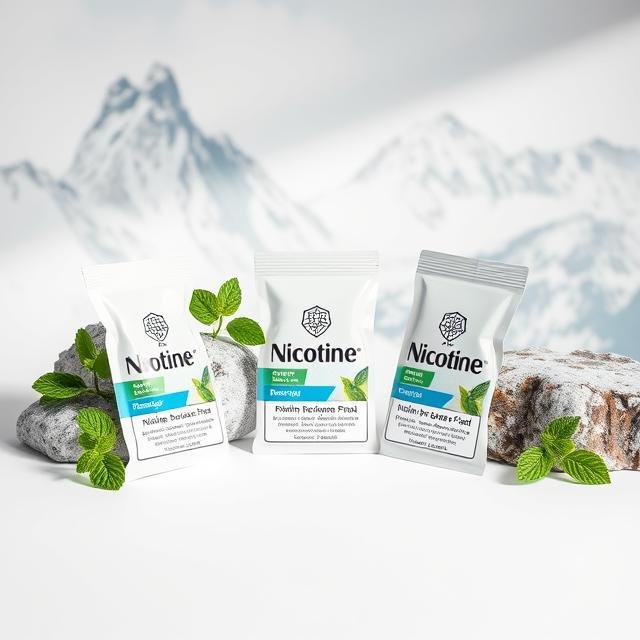Tucker Carlson Nicotine Pouches: The intersection of media personalities and consumer products has become increasingly common in recent years, with various celebrities and public figures launching their own brands across diverse industries. One particularly notable entry into the nicotine alternative market came from conservative media personality Tucker Carlson, who launched his own line of nicotine pouches under the brand name ALP. This development represents a significant moment in both the media landscape and the evolving tobacco alternatives industry.
Table of Contents
Background on Nicotine Pouches
Before examining Tucker Carlson’s specific involvement in this market, it’s important to understand what nicotine pouches are and their role in the broader tobacco alternatives landscape. Nicotine pouches are small, tobacco-free products that contain nicotine along with plant-based fibers, flavorings, and other ingredients. Users place these pouches between their lip and gum, where the nicotine is absorbed through the oral mucosa.
These products have gained popularity as an alternative to traditional tobacco products, including cigarettes, chewing tobacco, and other smokeless tobacco varieties. The appeal lies in their discreet nature, lack of tobacco leaf, and absence of smoke or vapor production. The global nicotine pouches market has experienced substantial growth in recent years, driven by consumers seeking reduced-risk alternatives to traditional tobacco products.
The nicotine pouch category includes various strength levels, typically ranging from low doses around 2-4 milligrams to higher concentrations of 8-12 milligrams or more. Flavoring options span a wide spectrum, from traditional mint and wintergreen to more exotic fruit and dessert flavors. The texture and moisture content of pouches can also vary significantly between brands, affecting user experience and satisfaction.
Tucker Carlson’s Entry into the Nicotine Pouch Market
Tucker Carlson launched his nicotine pouch brand ALP in late 2024, positioning it as “the first nicotine pouch brand made by and for adults who unapologetically love nicotine.” This venture represents a departure from his primary career in media and broadcasting, demonstrating the growing trend of public figures diversifying into consumer product markets.
The launch of ALP came through a strategic partnership structure. ALP is sold, marketed and distributed through ALP Supply Co., a newly formed 50/50 joint venture between the Tucker Carlson Network and Turning Point Brands. This business arrangement provides Carlson’s venture with established distribution channels and industry expertise while allowing him to maintain significant control over the brand’s direction and messaging.
The timing of Carlson’s entry into this market coincides with the broader expansion of the nicotine pouch category in the United States. As regulatory pressures on traditional tobacco products have increased, and consumer awareness of harm reduction alternatives has grown, the market has become increasingly attractive to both established tobacco companies and new entrants.
Product Specifications and Offerings
The ALP product line launches with three nicotine strengths — 3mg, 6mg, and 9mg — and in four distinct styles, including Chilled Mint, Mountain Wintergreen, Refreshing Chill and Tropical Fruit. This range of options reflects common industry practices of offering multiple strength levels to accommodate different user preferences and nicotine tolerances.
The product positioning emphasizes certain qualities that differentiate ALP from competitors in the market. ALP offers a moisture-rich nicotine pouch experience, positioning itself as an alternative to drier pouch options, with pouches designed for a softer mouthfeel optimized for flavor release and nicotine absorption. This focus on moisture content addresses a common consumer complaint about some nicotine pouch products, which can become dry and less satisfying over time.
The brand’s approach to product development appears to emphasize user experience and satisfaction. The moisture-rich formulation aims to provide consistent flavor release and nicotine delivery throughout the usage period, potentially addressing issues that some consumers experience with competing products that may lose their effectiveness or flavor intensity as they are used.
Market Context and Competition
The nicotine pouch market that Carlson entered is dominated by several established players, with ZYN being perhaps the most recognizable brand in the United States. Other significant competitors include brands like VELO, Rogue, and numerous international brands seeking to establish footholds in the American market.
Carlson’s entry into this competitive landscape brings unique elements, particularly in terms of brand positioning and target audience appeal. The messaging around ALP seems designed to appeal to consumers who appreciate direct, unapologetic approaches to nicotine consumption, potentially differentiating it from brands that may take more cautious or clinical approaches to marketing.
The broader market context includes ongoing regulatory developments, as the FDA continues to evaluate and establish frameworks for nicotine pouch products. These regulatory considerations affect all market participants, influencing everything from product formulations to marketing approaches and distribution channels.
Business Model and Social Impact
Beyond the core product offering, ALP has incorporated elements that extend beyond simple consumer goods sales. The brand commits to supporting meaningful causes, with a portion of sales contributing to initiatives such as K9 service dog rehabilitation, tree planting, and trade school scholarships. This approach reflects a growing trend among consumer brands to incorporate social responsibility elements into their business models.
This charitable giving component serves multiple purposes within the brand strategy. It provides a mechanism for consumers to feel that their purchases contribute to causes they may support, while also differentiating the brand from competitors who may not have similar programs. The specific causes chosen — service dog programs, environmental initiatives, and educational scholarships — align with values that may resonate with the brand’s target demographic.
The business model also reflects broader trends in how media personalities leverage their platforms and audiences to enter consumer product markets. By utilizing existing audience relationships and trust, public figures can potentially accelerate brand recognition and consumer adoption in ways that traditional startup companies might find more challenging.
Industry Implications and Consumer Considerations
The entry of high-profile media personalities into the nicotine pouch market raises several important considerations for both the industry and consumers. From an industry perspective, celebrity endorsements and brand launches can bring increased attention and legitimacy to product categories, potentially accelerating mainstream adoption.
For consumers, the involvement of recognizable public figures can provide both benefits and considerations. On one hand, the visibility and accountability that comes with celebrity association may drive higher quality standards and customer service. On the other hand, consumers should evaluate products based on their inherent qualities rather than solely on brand associations or celebrity endorsements.
The regulatory environment surrounding nicotine pouches continues to evolve, with ongoing discussions about appropriate oversight, marketing restrictions, and safety standards. All consumers considering nicotine pouch products should be aware of the regulatory landscape and make informed decisions about their use of any nicotine-containing products.
Consumer education remains crucial in this market, as nicotine pouches represent a relatively new product category for many American consumers. Understanding proper usage, potential effects, and individual tolerance levels becomes important for anyone considering these products, regardless of the specific brand or celebrity association.
Market Trends and Future Outlook
The nicotine pouch market continues to experience significant growth, driven by several converging factors. Increasing awareness of harm reduction approaches to nicotine consumption, regulatory pressures on traditional tobacco products, and evolving consumer preferences all contribute to expanding market opportunity.
Innovation within the category continues across multiple dimensions, including flavor development, nicotine delivery mechanisms, pouch materials and textures, and packaging solutions. These ongoing improvements suggest that the market will continue to evolve rapidly, with established players and new entrants competing across various product attributes.
The role of celebrity and influencer involvement in this market segment appears likely to continue expanding, as public figures recognize the commercial opportunity and audience alignment potential. This trend may bring both increased visibility to the category and additional scrutiny from regulatory and public health perspectives.
Distribution channel evolution also plays a crucial role in market development, with online sales, traditional retail partnerships, and specialized tobacco alternative retailers all contributing to product accessibility. The effectiveness of different distribution approaches may influence how brands position themselves and allocate marketing resources.
Frequently Asked Questions
Q: What are nicotine pouches and how do they work? A: Nicotine pouches are small, tobacco-free products containing nicotine, plant fibers, and flavorings. Users place them between their lip and gum, where nicotine is absorbed through oral tissues. They provide nicotine delivery without tobacco, smoke, or vapor.
Q: What nicotine strengths are available in Tucker Carlson’s ALP pouches? A: ALP pouches are available in three nicotine strengths: 3mg, 6mg, and 9mg. This range accommodates different user preferences and nicotine tolerance levels.
Q: What flavors does the ALP brand offer? A: ALP offers four distinct flavor profiles: Chilled Mint, Mountain Wintergreen, Refreshing Chill, and Tropical Fruit. The brand emphasizes moisture-rich formulations for enhanced flavor release.
Q: Are nicotine pouches safer than traditional tobacco products? A: While nicotine pouches don’t contain tobacco leaf and don’t produce smoke, they still contain nicotine, which is addictive. Users should consult healthcare providers for personalized advice about nicotine products and their individual health considerations.
Q: Where can consumers purchase ALP nicotine pouches? A: ALP pouches are distributed through various channels, including online retailers and select physical locations. The brand utilizes established distribution networks through its partnership with Turning Point Brands.
Q: What makes ALP different from other nicotine pouch brands? A: ALP positions itself as offering moisture-rich pouches designed for optimal flavor release and nicotine absorption, contrasting with drier alternatives. The brand also contributes portions of sales to charitable causes.
Q: Who should consider using nicotine pouches? A: Nicotine pouches are intended for adult consumers who currently use nicotine products. They are not intended for non-nicotine users, pregnant women, or individuals with certain health conditions. Medical consultation is recommended.
Q: How long do nicotine pouches last during use? A: Usage duration varies by individual preference and product formulation, but most users keep pouches in place for 15-60 minutes. The moisture-rich formulation of ALP aims to maintain effectiveness throughout the usage period.
Q: Are there age restrictions for purchasing nicotine pouches? A: Yes, nicotine pouches are restricted to adult consumers, typically 21 years or older, depending on local regulations. Age verification is required for all purchases.
Q: What should consumers know about nicotine addiction potential? A: All nicotine-containing products carry addiction potential. Users should be aware of their nicotine tolerance, use products responsibly, and seek medical advice if they have concerns about nicotine dependence.

